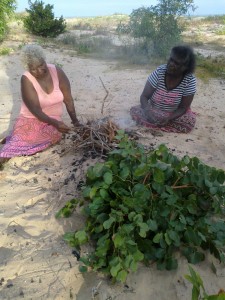Last year, while working at Relationships Australia I was in the privileged position to be involved in a healing ceremony for a teenager who had recently returned to her community after many years away. At that time, I had been working on the Tiwi Islands for six years and I had often wondered why the Tiwi people weren’t using more traditional ceremonial practices in their daily lives to heal the children, women and families that were accessing support through our counselling service. Did they think that whitefellas had all the answers about how to solve the problems blackfellas experienced? That Tiwi knowledge and traditional ways had nothing valuable to offer? Had the women lost the knowledge about how to do these traditional healing ceremonies? Or were they feeling disempowered due to lack of resources to offer it? It is very much part of my belief system that Tiwi culture offers so much in terms of emotional and spiritual healing, and in fact, empowering Tiwi people to heal themselves and each other is really the only way to make long lasting change from the impacts of intergenerational trauma. The traditional knowledge is there – I had heard it being talked about by old ladies for many years and I had seen a beautiful strong culture in action in various places – the art centres, out on bush camps, at footy games, at funerals and at Kulama ceremony time. So why was it then that Tiwi people did not feel confident to speak up and advocate for people accessing our counselling services? I imagined them saying strongly to me “What is needed here is to take this person out bush and do a smoking ceremony – that’s it, that will heal them”! I would have been totally supportive of such an initiative.
Despite my approach to social work practice which explicitly values two way learning, I was never asked to support a traditional healing ceremony for any of our clients. Until last year. And even then, I had to drop a hint into the ear of my cultural mentor “What would you have done in the old days if someone came home after being away a really long time?” I waited, then followed up with the more direct “Would you have done some healing on her? Our client, having lived in foster care much of her life, didn’t know much about her family, didn’t know the language and appeared to be struggling a little with fitting in, a month or so after being reunited with much loved Aunts and grandmothers. I could see the cogs ticking over in my cultural mentor’s mind, until a smile suddenly spread across her face. She realised, as this girl’s grandmother, she could definitely round up all the women and take our teenager out bush for a proper Welcome-into-our-Tiwi-family healing ceremony. So that’s what happened.
The word had spread gently but purposefully like a Dry Season burnoff through women’s channels in the community about what a difference this small gesture had made to the life of this teenager. I saw the chameleon-like change with my own eyes – she came back from that healing time and place a totally different person. The women were excited. Shortly after this, when we were asked to make a presentation to the regular women’s group about the services that Relationships Australia offer, instead I suggested, we facilitate a conversation about the role of traditional healing in recovery from trauma. So that’s what they did. It is so important that Tiwi women feel empowered to continue to value their knowledge and traditional healing practices, so that they may offer it to others who are hurting, lost or traumatised by their past. There are individuals and families that stand to benefit from these women’s healing hands, where Western counselling practices simply cannot go.
While I was able to bring a twist to the discussion by offering an opportunity for the women in the group to make a collage picture representing “What traditional Healing means to you?”, the Tiwi workers largely held the space on their own, with their awesome presence, age-old wisdom and loving devotion to each other. What was an isolated event for a teenager has now turned into a conversation which aims to keep traditional healing alive, by reclaiming forgotten stories, educating the young people and more actions to go out bush with the holders of this ancient knowledge.
The Tiwi women kindly allowed us to record some of their stories, so it would not be forgotten. Their hope is that their ‘Messages of Hope’ might assist other communities to bring back the traditional healing practices that have been passed down to them.
Because you know what? Sometimes we just have to give people a little push to remember the value of what once was.
Please watch their story and feel free to leave a message to send back to them.


I am pleased to see that you are able to support them in this self discovery.